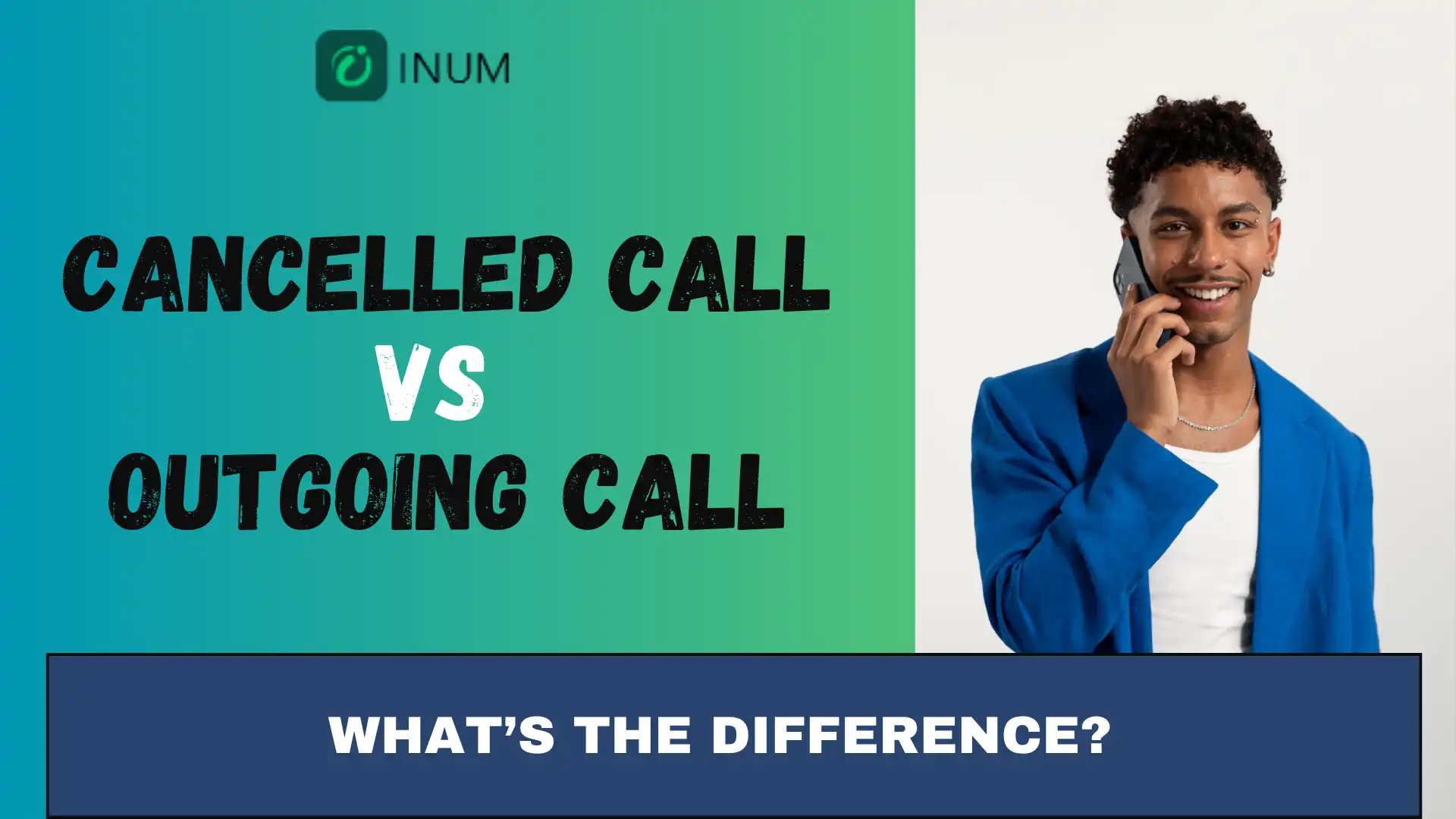Ever looked at your phone’s call log and noticed both “cancelled call” and “outgoing call” in your call log. You might have thought that both of them are the same thing. They sound similar, sure, but they actually mean very different things.
In this guide, we are breaking down the differences between cancelled calls and outgoing calls. We will keep things simple, real, and helpful. Whether you are curious, confused, or just trying to figure out why your phone said your last call was cancelled, we have got you.
What Is The Meaning Of A Cancelled Call?
A cancelled call happens when you hang up before the person picks up. Sometimes it is on purpose, sometimes the network just gives up trying to connect. Either way, the call never makes it to the other person’s phone.
If someone blocks you, your calls do not even try to go through. They are blocked right at the start.
You might get a little notification saying the call did not go through. Some phone carriers send those, some do not. It really depends on the service you use.
Most of the time, cancelled calls happen because of network problems. Maybe you are in a spot with a bad signal. Maybe the weather is rough or maybe your phone carrier is just having a bad day. It is annoying but it does not mean someone is ignoring you.
If this keeps happening and you are wondering why your iPhone call gets cancelled right away, it might be a good idea to ring up your carrier and ask. They can usually explain what’s up.
Examples of Cancelled Calls
- You call someone, but hang up after one ring.
- You dial by accident and hang up quickly.
- You hit a call, then realize it is the wrong person and end it fast.
Your phone logs that as a cancelled call because the call was never fully connected.
What Is An Outgoing Call?
An outgoing call is super simple: it is a call you make. You pick up your phone, dial someone’s number, hit the green button to make an outgoing call.
If someone else calls you, that is an incoming call. Usually, when you make a call (outgoing), you might get charged. When you get a call (incoming), you usually do not have to pay anything. But again, it depends on your phone plan and where you live.
There is a little twist here: Some businesses use what’s called toll-free numbers. When you call those numbers, you do not pay a dime, even though you’re the one making the call.
One last thing, if someone calls you but you do not pick up, that is a missed call. It happens to all of us.
Examples of Outgoing Calls
- You call your friend, and they answer.
- You call a business, and it goes to voicemail.
- You call someone, and they do not pick up.
All of these show up in your call log as “outgoing.”
Similarities Between Cancelled and Outgoing Calls
Cancelled and outgoing calls seem pretty different. One connects, the other does not. But they actually share a few things in common. Let’s break it down.
i. Originated By Caller
Whether it is cancelled or outgoing, the call always starts with the person who is making it. You are the one hitting the call button. The rest, whether it connects or not, comes after.
ii. Same Tech, Same Network
Both calls use the same phone network and systems. You dial the number, your phone reaches out to the carrier, and it tries to connect. The tech behind a cancelled call is not different from an outgoing one.
So, it is not the system that makes the difference, it is what happens after the call starts.
iii. The Process Followed
Dial the number, wait for it to go through, and hope they answer. That is the basic flow. Cancelled or not, it all starts the same way. What changes is whether you hang up or the call connects.
iv. Caller’s Control
Most of the time, you decide what happens. If you change your mind and end the call before they pick up, that is cancelled.
If you wait and they answer, that is outgoing. Sure, sometimes the network drops the ball. But usually, it is your call literally.
A Quick Comparison of Cancelled Calls Vs Outgoing Calls
Cancelled and outgoing calls might start the same way, but they do not end the same. Let’s break it down to see how they’re different in terms of purpose, outcome, and the info they leave behind.
Outgoing Calls
1. The Caller’s Intent
When you make an outgoing call, it is usually because you actually want to talk to someone. You are hoping they will pick up so you can chat or share info.
2. What Happens Next
If your call goes through, whether they answer or it hits voicemail, it counts as an outgoing call. Once the line connects, even if they do not pick up, it is logged as outgoing.
3. The Call Info
Outgoing calls leave a clear trail. You will see them in your call log, and so will the other person. You can usually check details like time, duration, and caller ID.
In short, outgoing calls are about real communication. You are reaching out with a purpose.
Cancelled Calls
1. The Caller’s Intent
This one is a bit mysterious. Maybe you dialed by mistake, changed your mind or maybe the signal was not strong enough. Either way, the call ends before the other person answers.
2. What Happens Next
A cancelled call never connects. No ringing on the other end, no voicemail, no conversation. It is like it started but didn’t go anywhere.
People often cancel a call if they realize they dialed the wrong number, or if they are unsure about whether they should call.
3. The Call Info
Cancelled calls are harder to track. Sometimes they show up in your call log, sometimes not. The person you tried calling might get a notification, depending on their carrier, but often, they would not even know you tried.
So, cancelled calls keep things private. They give you a chance to rethink the call before it even starts.
Pros And Cons Of Outgoing Calls
Let’s break it down what is great and what is not good about outgoing calls:
Pros of Outgoing Calls
- Direct Contact
You can reach the person you want to talk to, right then and there. - Real-Time Info Sharing
Got something urgent? Outgoing calls are the quickest way to get the message across. - Great for Staying Personal
Perfect for keeping in touch with friends, family, or even customers. Businesses often prefer calling because it feels more personal. - Two-Way Talk
Calls make it easy to ask and answer questions on the spot. No long wait times or email chains. - Instant Feedback
You can get opinions, updates, or decisions right away—no back-and-forth delays.
Cons of Outgoing Calls
- Takes Time
Calling one person at a time adds up, especially for companies with tons of customers.
- Not Always Picked Up
Some calls go unanswered or straight to voicemail. That can be frustrating.
- Can Cost Money
Depending on your phone plan or network, you might get charged for outgoing calls.
- Privacy Concerns
Some folks do not feel comfortable getting direct calls, especially from people they do not know well.
Pros and Cons Of Cancelled Calls
Cancelled calls are not always a bad thing. Sometimes, they are just part of how we use our phones. Let’s take a look at the ups and downs.
Pros of Cancelled Calls
i. Helps You Avoid Unwanted Chats
Not ready to talk or change your mind? Cancelled calls let you back out before it is too late.
ii. Gives You Time to Think
Sometimes you need a second to ask yourself, “Do I really need to make this call?” Cancelling gives you that space.
iii. Saves Time
No pointless small talk. No getting stuck in a long convo you did not really want.
iv. Keeps Your Info Private
If the call does not go through, the other person might never even know you tried calling. Your info stays with you.
Cons of Cancelled Calls
- Network Glitches Can Ruin It
Sometimes, the call doesn’t go through because of signal issues—not because you changed your mind. That blocks real conversations from happening. - Can Confuse the Other Person
If someone sees a missed call or gets a weird half-ring, they might be left wondering what’s up. - You will Probably Have to Call Again
If the call was important, you’ll need to try again later which can be annoying or inconvenient.
Does a Cancelled Call Mean I Was Ignored?
Not at all. If you see a cancelled call in your log, it usually means you ended the call. So there is no ghosting or ignoring going on.
If you are wondering about someone else cancelling on you? Again, it could mean anything. Maybe they misdialed or got busy. Do not overthink it.
What About iPhones vs Androids?
Both types of phones display “cancelled” and “outgoing” in a similar manner. But small differences exist:
iPhones
- Show “cancelled” in red text if it was not connected
- Show “outgoing” in black text if it went to voicemail or was answered
Androids
- Might just show all calls as “outgoing”
- Some Android phones don’t use the “cancelled” label
So your phone might log the same action differently depending on the brand.
Final Words – Cancelled Call vs Outgoing Call
Cancelled and outgoing calls might start the same, but they do not end the same. Outgoing calls go through whether someone answers or not. Cancelled calls? They stop before anything happens.
Knowing the difference can help you understand your call log better, avoid confusion, and even troubleshoot phone or signal issues. And not just because you see a cancelled call does not mean you were ignored. Most of the time, it is no big deal.
At the end of the day, both call types are part of everyday phone use. It is all about what you meant to do and what actually happened after you hit the call button.
Read More : 202 Area Code: Washington DC Telephone Code & Complete Guide
Read More : SMS vs RCS: What’s the Difference and Which Messaging Technology Is Better?



